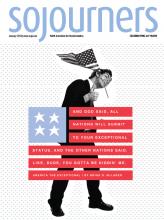THE RITUAL, LANGUAGE, and practice of forgiveness have bled into popular culture over the last few decades in unprecedented ways. What were once private acts of contrition have become a national craze.
Themes of self-forgiveness and repenting to curb addiction and abusive behaviors are staples for recovery-themed reality shows. The Forgive or Forget talk show ran between 1998 and 2000, a sensationalist pop-psych frontrunner featuring feuding and estranged family members. More recently, pop culture icons and self-help gurus such as Dr. Phil have taken the place of religious counselors, offering secularized advice on confession and atonement. Oprah’s grandiose apologies—those she’s demanded, accepted, and even occasionally offered—are a major part of her inspirational brand. Adulterous and embezzling politicians regularly ask for forgiveness in public—a request of their families as much as their constituents. None of this should be surprising, though. Spiritual leaders and renowned writers such as Archbishop Desmond Tutu, the Dalai Lama, and Hannah Arendt have said that forgiveness is an essential aspect of everyday life.
Not long ago, forgiveness was an issue restricted to and handled by the church. Many (if not all) faiths lean heavily on the idea that we all must continually seek forgiveness. Islam and Judaism have entire holidays devoted to penance—Lailatul Qadr, or the Night of Power during Ramadan, and Yom Kippur, or the Day of Atonement, respectively. Catholicism has long been tied to the tradition of confessing sins to a priest and asking for forgiveness. Christians know that Jesus’ last words on the cross were a plea that God would forgive those who crucified him. Even the Lord’s Prayer includes a line about seeking forgiveness for our sins.
Read the Full Article
